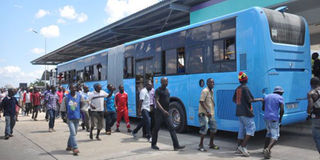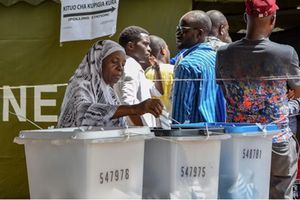High Court halts search for second Dart bus operator

What you need to know:
The order follows a request by Uda Rapid Transit Public Ltd to temporarily block procurement of a competitor as it mean ‘breach a contract giving them exclusive rights to operate rapid transit buses in the city’
Dar es Salaam. The High Court yesterday ordered parties to a suit challenging the plan by the Dar es Salaam Rapid Transit (Dart) Agency to procure a second bus operator to maintain status quo pending determination of a substantive petition.
The order follows a request by Uda Rapid Transit Public Limited Company and Shirika la Usafiri Dar es Salaam for the court to temporarily block the move for breaching a contract giving them exclusive rights to operate rapid transit buses in the city.
The decision issued by Justice Isaya Arufani means the Dart plan to procure a second bus operator is put on hold and the petitioners continue to enjoy exclusive rights to operate the buses.
The judge said that it will be in the interest of justice for the parties in the suit to maintain status quo because the matter is now before the court.
The petitioners had reached an agreement with Dart Agency on April 15 2016 to become Interim Service Providers (ISP) for the phase one of the Dart system. According to the agreement, the structure of phase one of the project should be done under Integral Deal Structure (IDS), meaning only one operator is involved in all aspects of the project.
The petitioners brought a suit against Dart Agency after learning that the latter had floated a tender to procure a second operator and a consultant for bus operations and fleet management.
The two fear they will suffer damage irreparably if the move is not halted because the implementation of the ISP agreement was based on its financial mode projected on the fact that the ISP operation would be undertaken by one service provider.
“Multiple operators will render the entire BRT operations in phase 1 not commercially viable,” argued the petitioners. They claimed to have invested Sh87.9 billion for acquisition of buses, logistical arrangements and compensation of daladala owners who were affected by the coming of the Bus Rapid Transit (BRT) project before the interim services operations commenced in May 2016.
“Currently, the petitioners are indebted to NMB (National Microfinance Bank) and other creditors to a tune of Sh92.3 whose repayment is based on the deal structure embodied in the ISP agreement where one service provider operates,” they further argue.
The complainant further argue that their employees, currently reaching 811, are likely to be out of employment if the structure of the project that was modeled on a single service provider is altered.
The petitioners further argue that it will not be able to meet its financial commitments to its lenders and suppliers if the BRT operations phase one cease to be commercially viable.
It is understood that under the ISP agreement, the first petitioner, Uda-RT, was to provide interim bus service for phase one of the project for an initial period of two to three years.
Under the agreement, Uda-RT will later work with the winning bidder to jointly form the Service Provider (SP) and continue to provide services for phase one of the project.
The petitioner claim to have entered into financing arrangement with NMB to enable it finance several obligations.
It has secured a $14 million to finance the importation of 84 units of BRT buses and Sh2 billion for compensation of the affected daladala operators.
The petitioners also claim to have purchased 54 BRT buses through another credit arrangement.
Again on October 1, 2015, the company secured Sh11.5 billion from NMB to finance purchase of Intelligent Transport System (ITS) and Near Field Communication Cards (NFC).
Through K & M (Advocates), the petitioners claim a Chinese company, which supplied them 54 buses, has threatened to recall its facility and repossess its buses owing to the conduct of the Uda-RT to overturn the ISP agreement.
It also claim that its main creditor with credit facilities advanced to the first petitioner over Sh50 million, NMB bank, has expressed frustration on the respondent’s conduct and was intending to call off its credit facilities.




